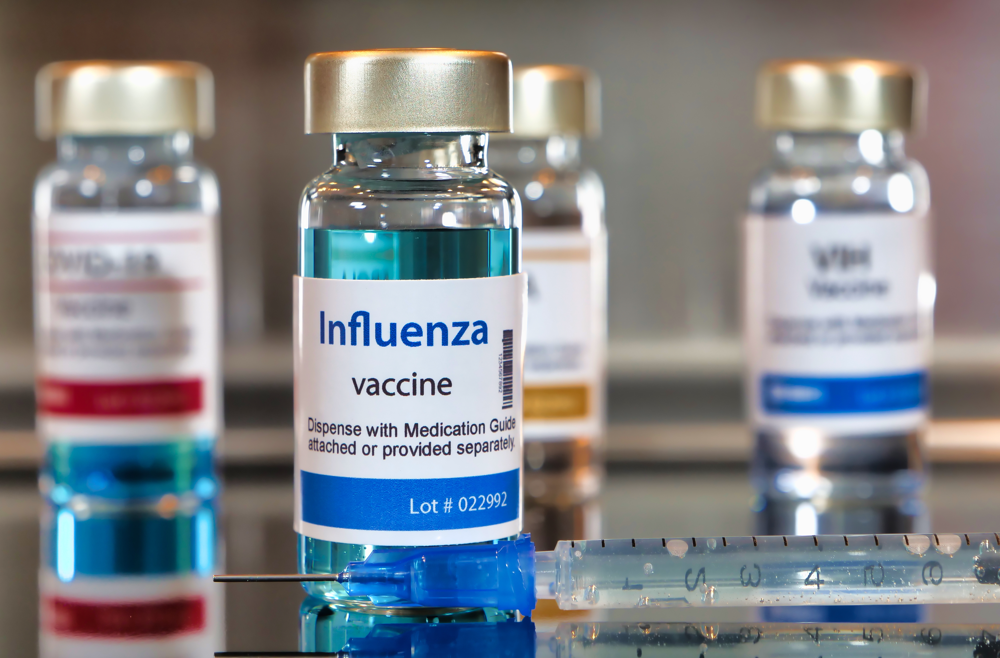The Different Types of Flu Vaccines
The Centers for Disease Control and Prevention (CDC) recommends that all patients 6 months old or older receive an influenza vaccine every flu season. Different kinds of flu vaccines have approval for use in people in various age groups. While the CDC does not recommend one type of vaccine over another, each type has approval for certain patient demographics. Flu shots fall into two categories — trivalent and quadrivalent vaccines.

Trivalent Flu Vaccines
Trivalent flu vaccines defend the patient against three influenza viruses — one influenza A (H1N1) virus, one influenza A (H3N2) virus and one influenza B virus. Today, most flu vaccines are quadrivalent vaccines that protect against four viruses instead of trivalent vaccines, but some healthcare providers still administer them.
Standard-Dose Trivalent Vaccines
A standard-dose trivalent shot features three egg-grown viruses administered with a needle. Medical professionals can deliver standard trivalent vaccines to patients ages 18 to 64 years old.
Trivalent Shots With an Adjuvant
Some trivalent shots include an adjuvant, which is an ingredient that helps the vaccine create a stronger immune response.
Known under the brand name FLUAD, this type of flu vaccine contains an oil-in-water emulsion of squalene oil called MF59 that acts as the adjuvant. MF59 exists naturally in a variety of plant and animal cells, including human cells. Trivalent flu vaccines with the MF59 adjuvant only have approval for use in patients age 65 or older.
Quadrivalent Flu Vaccines
Vaccine manufacturers estimate that 99 percent of 2020-2021 flu season shots will be quadrivalent vaccines. Quadrivalent influenza shots defend the patient against four viruses — two influenza A viruses and two influenza B viruses. This composition allows it to provide more comprehensive protection against influenza.
The suitability of a quadrivalent vaccine over a trivalent one depends on the patient's age, medical history and allergies. When a patient can receive a quadrivalent vaccine, it can deliver broader infection protection than a trivalent shot.
Standard-Dose Quadrivalent Shots
Standard-dose quadrivalent vaccines for the flu can have inactivated viruses grown in eggs or cell cultures, providing options for patients with and without egg allergies. Different brands of quadrivalent vaccines suit patients in various groups.
The most commonly used standard-dose quadrivalent shot with inactivated egg-grown viruses can treat patients 6 months old or older. Meanwhile, patients aged 4 years or older can receive the vaccine with inactivated viruses grown in a cell culture.
Jet-Injection Quadrivalent Shot
Medical professionals can administer the AFLURIA Quadrivalent flu shot using a needle or jet injector. A jet injector uses a high-pressure fluid stream to deliver a vaccine and has approval in use for patients aged 18 to 64 years. The advantages of jet injection over needle injection include:
- Improved compliance due to more accurate delivery
- Potentially less pain for the patient (vaccine contents may cause burning or stinging sensation)
- Reduced needle-related risks such as contamination and needlestick injuries
- Eliminated need for sharps disposal
High-Dose Quadrivalent Shots
The Fluzone High-Dose Quadrivalent vaccine has approval for use in people age 65 and older. Compared to standard-dose quadrivalent vaccines, this shot has four times the antigen to provide a stronger immune response in older patients. Patients age 65 and older tend to have a poorer immune response to flu vaccines than younger people, and the higher dose in this vaccine aims to account for that fact. Since the virus in high-dose quadrivalent vaccines grows in egg, people with egg allergies cannot receive it.
Recombinant Quadrivalent Shot
Recombinant quadrivalent vaccines have synthetically created viruses that do not use eggs at any point in the manufacturing process. Currently, the only FDA-approved recombinant quadrivalent vaccine is Flublok Quadrivalent. It has approval for use in patients aged 18 years and older.
During recombinant vaccine manufacturing, scientists use DNA to replicate the surface protein hemagglutinin (HA) on the influenza virus. The HA serves as an antigen to trigger the patient's antibody production in response to the target virus. Then, they combine it with the baculovirus, which is a virus that helps transfer the HA to the patient's cells.
Intranasal Spray
A live attenuated intranasal spray vaccine for the flu has attenuated viruses instead of inactivated ones. Rather than having dead viruses, the nasal spray has severely weakened viruses that can't cause a widespread infection. This vaccine has approval to treat patients aged 2 to 49 years old with a suitable medical profile. Patients outside of the recommended age range, with immunocompromised systems or specific allergies, should not receive the nasal spray vaccine.
Adjuvanted Vaccine
Like trivalent flu vaccines, quadrivalent influenza shots feature adjuvanted options. The adjuvanted quadrivalent flu vaccine, FLUAD Quadrivalent, uses MF59 as an adjuvant like its trivalent counterpart. FLUAD Quadrivalent should only treat patients age 65 or older.
Inactivated Influenza Vaccines, Recombinant Influenza Vaccines and Live Attenuated Influenza Vaccines
You can also categorize influenza vaccines by the type of virus used. The CDC's Advisory Committee on Immunization Practices (ACIP) has no preference over which kind of vaccine to use as long as the shot has licensure from the FDA. The three types of vaccine based on virus include:
- Inactivated influenced vaccines (IIVs): IIVs feature an inactivated (killed) virus grown in an egg medium or cell culture. The IIVs for the 2020-2021 flu season will have indications for people of all ages, depending on the brand of vaccine and formulation.
- Recombinant influenza vaccines (RIV4): RIV4s feature recombinant viruses synthetically made without eggs or an actual influenza virus. During the 2020-2021 flu season, only one recombinant vaccine will have approval for use.
- Live attenuated influenza vaccines (LAIV4): LAIV4s include a live influenza virus weakened to trigger an immune response without an infection risk. The 2020-2021 flu season LAIV4 will come in the form of an intranasal spray instead of an injection.
Medical Supplies and Equipment From Mercedes Scientific
Mercedes Scientific sells a comprehensive inventory of laboratory and medical supplies, including rapid influenza tests. For more information about our influenza supplies, you may contact us.

